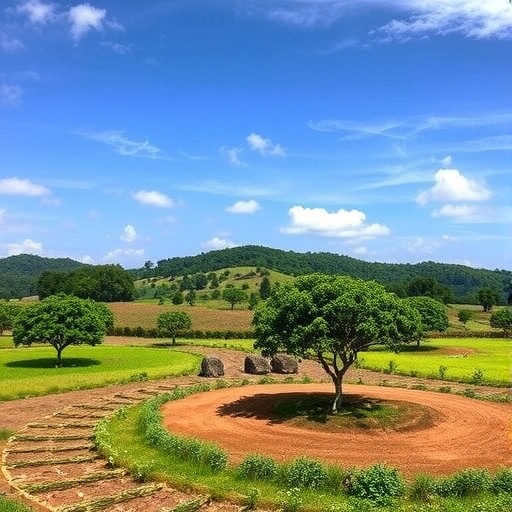In a groundbreaking study published in the journal Discover Agriculture, researchers Marie, Lemessa, and Esa delve into the intricate dynamics of socio-ecological factors affecting woody carbon stocks across various agroforestry systems in Northwestern Ethiopia. As climate change presents one of the most formidable challenges of our time, understanding the interplay between agriculture, forestry, and carbon sequestration has become increasingly urgent. This research sheds light on how diverse agroforestry practices can be optimized to enhance carbon storage in woody biomass, a critical factor in combating atmospheric carbon levels.
Agroforestry is the integrated approach that combines agricultural and forestry practices to create more sustainable land-use systems. This method is particularly pertinent in regions vulnerable to climate change, where biodiversity loss and soil degradation threaten food security and ecological health. The authors of the paper emphasize that agroforestry not only presents opportunities for increasing crop yields but also plays a significant role in mitigating climate change by enhancing carbon stocks in the landscape.
The research underscores the variability of woody carbon stocks across different agroforestry practices, demonstrating that not all systems are equally effective in sequestering carbon. By compiling extensive field data, the study elucidates the relationships between tree cover, soil type, climatic conditions, and management practices within these agroforestry systems. This comprehensive analysis allows for the identification of best practices that maximize carbon storage while also supporting local agricultural needs.
One of the most compelling aspects of the study is its focus on socio-ecological factors, which are often overlooked in traditional agricultural research. The authors argue that human behavior, socio-economic status, and cultural practices are critical in determining the success of agroforestry systems. Engaging local communities in sustainable practices, incentivizing tree planting, and providing education on the benefits of carbon sequestration are essential for maximizing the positive impacts of these systems.
The findings suggest that socio-economic incentives can significantly influence land-use decisions. For instance, when farmers are provided with financial rewards or resources to implement agroforestry practices, they are more likely to commit to sustainable methods that increase woody carbon stocks. This positively affects both the local ecosystem and the farmers’ livelihoods, creating a win-win situation that promotes environmental stewardship and economic resilience.
Moreover, the researchers highlight the importance of specific tree species in enhancing carbon stocks. Certain native species are particularly effective at sequestering carbon due to their growth rates, biomass density, and adaptability to local climatic conditions. By promoting these species within agroforestry systems, communities can not only boost their ecological impact but also ensure that the trees thrive in their specific environments, leading to long-term sustainability.
A significant portion of the study is dedicated to modeling the potential carbon sequestration outcomes under various management scenarios. The simulations reveal that adopting optimal agroforestry practices could lead to substantial increases in woody carbon stocks over time. These models serve as a crucial tool for policymakers and land managers, providing them with insights into how to allocate resources and tailor interventions to maximize carbon capture.
The research also draws attention to the role of policy frameworks in advancing agroforestry initiatives. The authors argue that supportive government policies are paramount to fostering conditions conducive to sustainable land-use practices. Investment in research and development, provision of financial aid, and the establishment of clear property rights can significantly enhance the effectiveness of agroforestry systems.
Furthermore, the implications of this research extend beyond Ethiopia, as the insights gleaned can be beneficial for agroforestry practices globally. Countries facing similar socio-ecological challenges can learn from Ethiopia’s experience, adapting strategies suited to their unique contexts. This shared knowledge fosters a collaborative approach to tackling climate change, affirming that global cooperation is essential in this fight.
As the world grapples with the ever-increasing impacts of climate change, studies like this play a crucial role in illuminating pathways towards sustainable agriculture. By enhancing our understanding of the socio-ecological dimensions of agroforestry, researchers are paving the way for innovative solutions that harmoniously integrate agricultural productivity with environmental conservation.
In conclusion, the work by Marie, Lemessa, and Esa encapsulates the necessity of an interdisciplinary approach to understanding the effects of agroforestry on carbon stocks. Their contributions not only enrich scientific discourse but also offer practical solutions for communities navigating the complexities of climate change. The study serves as a clarion call to leverage agroforestry as a potent tool in the quest for sustainability, revealing the profound interconnectedness of human and ecological well-being.
By forwarding this compelling research, the authors invite policymakers, land managers, and the global community to consider the implications of their findings and advocate for the integration of efficient and sustainable agroforestry practices in their respective regions. The time to act is now, as the convergence of socio-economic factors and ecological sustainability emerges as a beacon of hope in the fight against climate change.
Subject of Research: The impacts of socio-ecological factors on woody carbon stocks under different agroforestry practices in Northwestern Ethiopia.
Article Title: Examining the impacts of socio-ecological factors on woody carbon stocks under different agroforestry practices in Northwestern Ethiopia.
Article References:
Marie, M., Lemessa, D., Esa, E. et al. Examining the impacts of socio-ecological factors on woody carbon stocks under different agroforestry practices in Northwestern Ethiopia.
Discov Agric 3, 139 (2025). https://doi.org/10.1007/s44279-025-00328-y
Image Credits: AI Generated
DOI: https://doi.org/10.1007/s44279-025-00328-y
Keywords: Agroforestry, Carbon Sequestration, Socio-Ecological Factors, Climate Change, Sustainable Agriculture.




